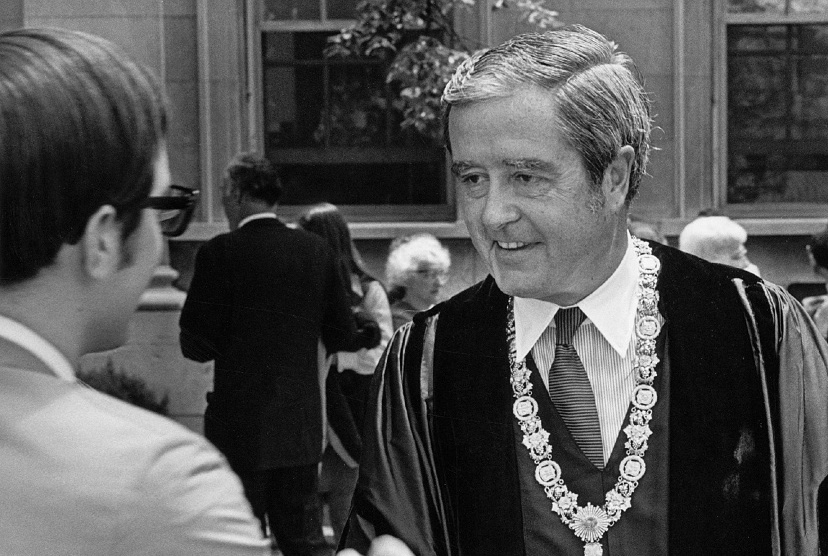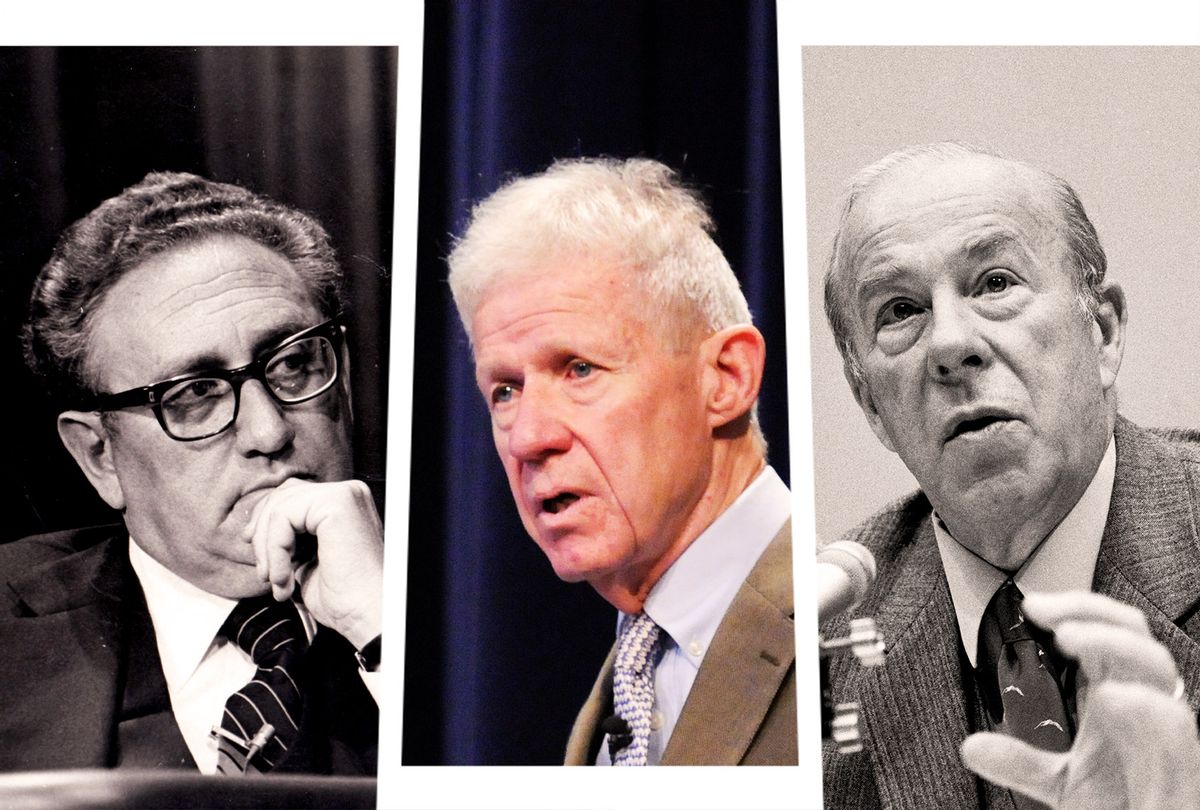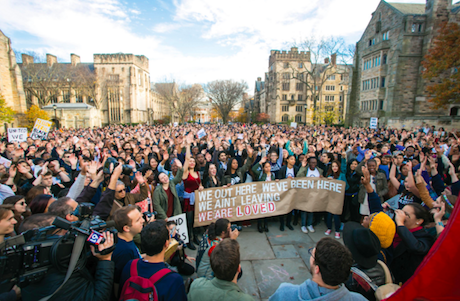Liberal Education and Civic Leadership Training
 r.
r.
Yale President Kingman Brewster, Jr, 1967.
A liberal democracy relies on its citizens to uphold, voluntarily, certain public virtues and beliefs that neither the liberal state nor markets truly nourish or defend. The liberal state can’t do it because it’s not supposed to impose one way of life over another, so it can’t always distinguish legally or morally between constructive entrepreneurs and opportunistic free riders. Markets can’t do it because they “work” by approaching individuals primarily as self-interested investors and consumers, not as citizens who can be relied on to restrain their self-interest at times to enhance the public interest.
But American colleges and the private preparatory and public schools did traditionally nourish and defend civic virtues and beliefs. They strengthened the common good by preparing their students for civic and political responsibility and leadership — sometimes even for dissenting leadership. Yet most colleges and schools were institutionally racist. sexist, and elitist. Many of their “old-school” alumni were clubby managers and facilitators of financial, legal, and business establishments that served states and markets more readily than they nourished civic-republican virtues.
Still, if you had to choose between today’s would-be autocrats, on the one hand, and graduates of Harvard, Yale, and Princeton such as Franklin D. Roosevelt, Dean Acheson, and George F. Kennan, you’d choose the latter, hoping that they’d been trained to hold themselves accountable to civic-republican standards, even though they sometimes departed from them for “clubby,” partisan, and ideological purposes.
Some of the following pieces take you into those collegiate, civic-republican struggles to balance truth-seeking with wealth making and accountable power-wielding. After the 1960s, many old, selective, civic-republican colleges like Yale tried to throw out the dirty bathwater of their institutional racism, sexism, and elitism. But they also threw out the baby of strong, civic-republican social bonding that had come from a WASP, patrilineal culture. Now it would would have to come from somewhere else, but from where, and from what? The hard truth is that the old colleges haven’t found new wellsprings. They’ve have been overwhelmed by “liberal” and “market” forces that have no moorings or trajectories to keep faith with.

In the middle of the last decade, conservatives, who’d been complaining about the loss of direction ever since William F. Buckley Jr. had written God and Man at Yale in 1954, mounted a ferocious campaign to blame leftist political correctness and godless socialism but not the market forces that were narrowing education’s horizons to those of investors and consumers. I pushed back against that assault, even though I’m also critical of racial identity politics (white and otherwise), and of a lot else that’s considered “politically correct.” The following pieces sort through these charges. I find political correctness loathsome but not as decisive as the seemingly more anodyne but more destructive marketization of liberal education. The colleges don’t challenge the casino-like financialization of their own missions; they succumb to it and even celebrate it. Take a look:
Training a republic’s governing elites, Los Angeles Times Book Review, 2004, a review of The Guardians, by Geoffrey Kabaservice. In this review I revivified a civic-republican standard for liberal education that sees beyond certitudes of left and right in order to be itself and to stimulate open, but rigorous thinking. Years later, when Trump’s presidency and impeachment had made these matters even more urgent, I made similar arguments more briefly for undergraduate readers of The Yale Daily News
Mark Shields Had Ivy League Fatigue — and He Had a Point, The Boston Globe, Sunday, June 28, 2022, with reader comments: jimsleeper.com » Shields vs the Ivy League
Allan Bloom and the Conservative Mind, The New York Times, 2005. (Where the conservative campaign to rescue liberal education from liberals goes wrong — and betrays one of its supposed heroes, Allan Bloom.
The conservative ‘Blame the Liberals” campaign hits Yale, 2016, HuffingtonPost and at Truthdig and AlterNet.
David Brooks’ Dreams of Ivy. TPMCafe, Nov. 21, 2008. Now he loves a leadership style that he once disparaged.
“Blame Those Ivy League Liberals!”, urge conservative pundits, recycling a familiar dodge of the real reasons why income disparities are destroying American politics. TPMCafe, Oct. 25, 2010
Political Correctness and Its Real Enemies, New York Times, 2016
With Friends Like These, Who Will Defend Liberal Education? Dissent magazine, 2012
What ‘Liberal’ Academy? October 21, 2009. In writing this column and this letter to The Chronicle of Higher Education, I was provoked by an exchange there among Mark Lilla, Alan Wolfe, and Bruce L. R. Smith about “liberal” bias against conservative scholars. Most of their observations missed the elephant in the room: The real cause of intellectual and cultural conformity on many campuses isn’t leftists or liberals, silly though their priorities and policies have may be, but swift market currents driving students and administrators, as well as professors themselves. The Chronicle published my letter, and my column gives it some context.
The more important challenge, I say at least briefly in these two essays and will address more directly this fall, is to renew what’s best in these schools, which do have a special role to play in American public discourse and regeneration. To say that the colleges are compromised by the increasingly illegitimate and unsustainable regime they currently serve is only half an answer: They haven’t always been in synch with the powers of the day, and they’ve sometimes stood apart and stimulated real reform.
Renew America’s great liberal-arts colleges, don’t just assail them. I posed this challenge in Bookforum in June, 2014 and more broadly in Salon, July 25, 2014, as former Yale English Professor and essayist William Deresiewicz became the latest would-be prophet to succumb to marketing pressures. The New Republic ran a chapter of his book Excellent Sheep under the headline, “Don’t Send Your Kids to the Ivy League!”, fulfilling my prediction, in Bookforum, that, by promoting books like his, the gilded cage’s conscience-keepers would drag the kept through yet another empty ritual of self-flagellation on their way back to college. As I explain further in Salon — and as others noted later — there’s a monumental hypocrisy in Ivy League editors’ and professors’ telling 18-year-olds and parents to avoid the colleges that they themselves attended or taught at and would still do anything to send their own kids to.
Yale’s Grand Strategy program trains U.S. leaders without educating them, Foreign Policy magazine, 2021.
What Politics Does to History. How a former senior U.S. Foreign Service officer miscarried liberal education as Yale’s Diplomat in Residence. Salon, 2021
 Henry Kissinger, Charles Hill and George Shultz (Photo illustration by Salon/Getty Images/U.S. Navy/Eric Dietrich)
Henry Kissinger, Charles Hill and George Shultz (Photo illustration by Salon/Getty Images/U.S. Navy/Eric Dietrich)
Loyalty Gone Wrong: Review of The Man TIME Forgot, by Isaiah Wilner, Yale Alumni Magazine, 2006 (Scroll way down the pdf to “Loyalty Gone Wrong”) If you tend to idealize the “old,” white-male Yale, this may temper your enthusiasm.
Billionaires can’t fix colleges. Interview with Jim Sleeper Salon, May 27, 2019, and Historian’s Eye, The Education Project, (Transcript and aural recording) on liberal education’s prospects amid the sea changes in the funding and organizing of American colleges that reflect changes in the casino-like financing and marketing of the society they now serve.
Podcast with Jim Sleeper on American liberal educators’ mixed purposes and dubious prospects abroad, for the Carnegie Council on Ethics & International Affairs, 2015. (This discussion was based on my essay for the council’s Journal of Ethics & International Affairs, “Innocents Abroad? Liberal Educators in Illiberal Societies.” That essay is re-published in 2022 in the anthology Normative Tensions: Academic Freedom in International Education.)
Liberal education vs, money, power, and public relations. “Examining the Crimson’s Civic Slide,” The Boston Globe, 2008. Review of former Harvard College Dean Harry Lewis’ book, Education Without a Soul.)
Two re-namings of buildings, two defaults: How and how not to use history and public memory on a campus. It was appropriate to remove the name of ardent slavery proponent John C. Calhoun’s from a residential college at Yale. But was it appropriate to rename The Commons for a self-celebrating, self-exculpating rich guy?
Where liberal education and leadership diverge. This essay ran in 2005 in the Yale Politic and was picked up, interestingly, by Leatherneck, a U.S. Marine publication.
Humanists and Warriors: How and How Not to Study Humanities at Yale. The Politic, 2007. See also http://thepolitic.org/?p=59
Safe Spaces — A View From Yale, Interview with Jim Sleeper at openDemocracy, 2016

What Conservatives’ Campus ‘Free Speech’ Crusade Doesn’t Dare to Say, AlterNet, September 2016.
Political Correctness Reflects Crises More Than It Causes Them – NYTimes.com, Nov. 12 2016